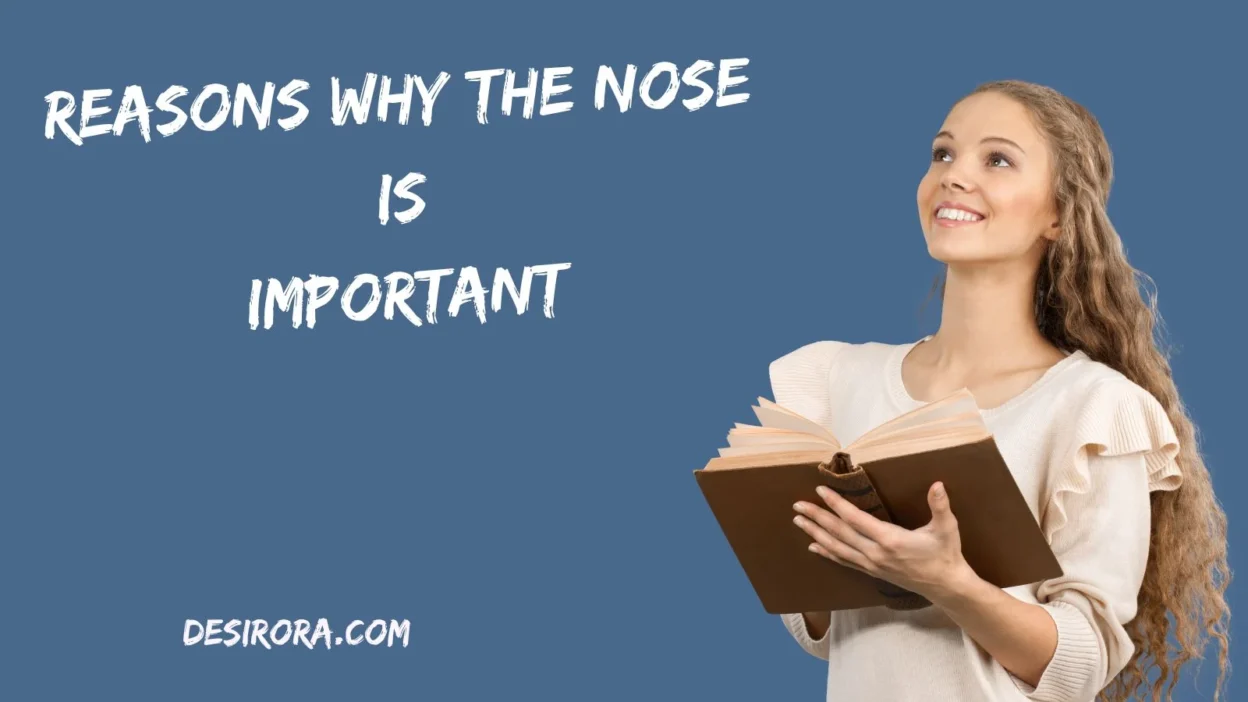Your nose does far more than sit quietly in the center of your face. It’s a multitasking organ that works nonstop—filtering the air you breathe, shaping the way food tastes, protecting you from harmful substances, and even triggering deep emotional memories. Whether you’re enjoying the smell of fresh bread, taking a calming breath, or detecting danger in your surroundings, your nose plays a leading role. Yet most people only notice it when it’s blocked or irritated.
Understanding how important the nose truly is can change the way you view your health, your senses, and even your daily habits. From breathing comfortably to experiencing the world more fully, your nose influences more of your life than you think.
The Nose: More Than Just a Facial Feature
Most people don’t think much about their nose unless it’s blocked, itchy, or runny. But the truth is, your nose is one of the most hardworking organs in your body. Every time you breathe, smell food, sense danger, or enjoy a pleasant scent, your nose is behind the scenes doing countless tasks. It’s not just a shape on your face—it’s a vital part of your survival, comfort, emotions, and overall health.
From helping you breathe clean, warm air to influencing your memories and emotions, the nose plays a central role. Once you understand what it does, you’ll appreciate it in a whole new way.
The Anatomy of the Nose and Why It Matters
Before diving into why the nose is so important, it helps to understand its basic structure. The nose isn’t just the visible part; it’s a deep system of cartilage, bone, mucous membranes, cilia, and olfactory nerves.
Here’s a quick breakdown of essential parts:
| Nose Component | What It Does |
| Nasal cavity | Main passage where air flows, warms, and humidifies |
| Nostrils (nares) | Entry points that regulate airflow |
| Septum | Divides the nasal cavity into two sides |
| Turbinates | Curved bones that increase surface area for filtering |
| Olfactory bulb | Detects smell signals and sends them to the brain |
| Cilia | Tiny hairs that trap dust and push it out |
| Mucus membrane | Produces mucus to catch bacteria and keep the nose moist |
These parts work together like a well-coordinated team. One small problem—like a deviated septum or swollen turbinates—can affect breathing, sleep, smell, and even your sense of taste.
How the Nose Supports Healthy Breathing
Breathing might feel automatic, but the quality of the air you breathe depends heavily on your nose. When you breathe through your nose (instead of your mouth), you allow your body to take in air the way it was designed to.
Here’s why nose breathing is superior:
- It regulates airflow
- It reduces stress by activating your parasympathetic nervous system
- It supports better oxygen absorption
- It protects your lungs from irritants
- It prevents dry mouth and throat irritation
Mouth breathing bypasses these protections, which is why chronic mouth breathers often experience fatigue, sleep issues, and dental problems.
The Nose’s Role in Filtering, Warming & Humidifying Air
One of the biggest reasons your nose is important is its ability to improve air before it enters your lungs. Every breath is cleaned, adjusted, and optimized.
Filtering the Air
Your nose filters:
- Dust
- Smoke
- Bacteria
- Pollen
- Environmental pollutants
- Viral particles
- Allergens
Tiny hairs (cilia) and mucus work like a natural air filter system. Without it, your lungs would be flooded with irritants.
Warming the Air
Cold air can irritate your lungs. The nose warms incoming air to body temperature almost instantly, making breathing comfortable—even in winter.
Humidifying the Air
Dry air can cause throat irritation, coughing, and dehydration. Your nose adds moisture to prevent this, helping maintain a comfortable and healthy respiratory system.
All these functions help protect the lungs, reduce infection risk, and support smoother breathing.
Why Your Sense of Smell Is Essential for Daily Life
Your sense of smell is more powerful than most people realize. It affects how you eat, interact with others, remember life experiences, and detect danger.
Smell Enhances Experiences
Think about how different life would feel without smell:
- Food would be bland
- Fresh flowers wouldn’t be enjoyable
- You wouldn’t recognize your favorite perfume
- Rainstorms, forests, and beach air wouldn’t feel the same
Smell plays a huge role in pleasure and comfort.
Smell Helps Identify People & Places
You might not realize it, but your brain stores scent memories. A familiar scent can instantly make you feel safe, nostalgic, or even emotional.
The Nose and Taste: A Powerful Partnership
Have you ever noticed how food seems tasteless when your nose is blocked? That’s because taste and smell are deeply connected. Nearly 80% of flavor comes from smell, not taste buds.
Your tongue detects basic tastes:
- Sweet
- Salty
- Sour
- Bitter
- Umami
But your nose helps detect complex flavors like:
- Spices
- Herbs
- Chocolates
- Roasted foods
- Fruits
- Cheese notes
That’s why chefs rely heavily on their sense of smell. If you lose your sense of smell, eating becomes far less enjoyable and sometimes even depressing.
How the Nose Protects You From Danger
Your nose is an early warning system. It alerts you to danger long before you see it.
Examples of Danger Signals
- Smoke → Signals a fire
- Gas leak → Alerts to deadly fumes
- Spoiled food → Prevents food poisoning
- Chemical smells → Warns of toxins
- Strong odors → Can detect harmful substances
Without your nose’s warnings, daily life would be far less safe.
The Nose and Your Immune System
Your nose is your body’s first line of defense against viruses and bacteria. It traps invaders before they reach your lungs.
How It Protects You
- Mucus catches pathogens
- Cilia push out harmful particles
- Immune cells in the nasal lining destroy germs
- Proper nasal humidity prevents infection
- Nasal breathing filters out allergens
Even sneezing is a protection mechanism—your body forcefully ejects irritants to keep your system clear.
Emotional Connections: Smell and Memory
Smell is the only sense directly connected to the limbic system—your brain’s emotional center. That’s why certain scents trigger intense memories, even from childhood.
Real-life examples of scent-triggered memories
- The smell of rain reminding you of your hometown
- A specific perfume making you think of a loved one
- The aroma of a bakery reminding you of your grandmother’s cooking
This emotional link makes smell vital for mental well-being and emotional connection.
Social Communication and Human Interaction
Smell plays a subtle but powerful role in how we interact with others. Even though humans don’t rely on scent communication as strongly as animals, it still influences:
- Attraction
- Bonding
- Comfort
- Social cues
- Personal space
- Emotional connection
For example, babies recognize their mothers by scent alone long before vision fully develops. Partners also subconsciously react to each other’s natural scent, which can increase bonding.
The Nose in Different Cultures and Traditions
Across the world, the nose holds cultural, symbolic, and traditional meanings.
Examples of Cultural Importance
- In some cultures, a well-shaped nose symbolizes beauty and status.
- Nose rings in South Asian traditions can represent marriage, identity, or cultural pride.
- Certain rituals use scented oils, incense, or flowers to create spiritual or emotional experiences.
These traditions highlight how the nose contributes to identity, symbolism, and cultural expression.
Common Nose-Related Issues and What They Mean
Because the nose does so much, even small issues can impact your daily life.
Common Conditions
- Allergic rhinitis
- Sinus infections
- Nasal congestion
- Nosebleeds
- Deviated septum
- Nasal polyps
- Anosmia (loss of smell)
- Post-nasal drip
Each of these affects breathing, sleep quality, taste, and overall comfort.
Symptoms to Watch
- Frequent congestion
- Reduced sense of smell
- Snoring or poor sleep
- Difficulty breathing through the nose
These issues shouldn’t be ignored because they can disrupt daily life and indicate deeper health concerns.
How to Take Care of Your Nose
Taking care of your nose helps maintain healthy breathing, strong immunity, and a good sense of smell.
Tips for a Healthy Nose
- Keep your environment clean and dust-free
- Use a humidifier during dry seasons
- Stay hydrated
- Avoid smoking and secondhand smoke
- Rinse your nose with saline if needed
- Get medical help for chronic issues
- Practice nose breathing
- Maintain good hygiene during flu season
Small habits can dramatically improve your nasal health.
Real-Life Examples of the Nose’s Importance
Cooking & Eating
Chefs rely heavily on their sense of smell to judge freshness, flavor, and quality. A blocked nose can make cooking nearly impossible.
Parents and Babies
Newborns use smell to recognize their mothers. Mothers also sense subtle changes in their babies through smell.
Outdoor Activities
When hiking or camping, scent can help identify smoke, animals, or environmental changes.
Work in Healthcare or Safety
Nurses, firefighters, and lab workers use their sense of smell as a part of their safety awareness.
Daily Life
Whether you’re choosing ripe fruit in the market or enjoying perfume on a special day, your nose influences your choices and experiences.
FAQs
Why is the nose important for breathing?
The nose filters, warms, and humidifies air, making it easier and safer for your lungs to process.
Does the nose help with taste?
Yes. Nearly 80% of flavor comes from your sense of smell, which is why food tastes bland when your nose is blocked.
Why does the nose produce mucus?
Mucus traps dust, bacteria, and viruses while keeping the nasal passages moist and healthy.
Can you improve your sense of smell?
Smell training, hydration, avoiding smoking, and treating allergies can help improve your sense of smell.
Why does smell trigger strong memories?
The olfactory system links directly to the brain’s emotional center, making scent-based memories more powerful than visual or auditory ones.
Conclusion
Your nose is an incredible organ with a long list of responsibilities. It supports breathing, immunity, taste, safety, memory, and emotional connection. By understanding its importance and taking care of it, you can improve your health, strengthen your senses, and enjoy richer daily experiences. The next time you take a deep breath or savor a delicious meal, you’ll know exactly how much your nose contributes.

Aldous Huxley was a visionary writer and philosopher whose works explored human nature, consciousness, and the future of society. His ideas continue to challenge minds and inspire generations.



